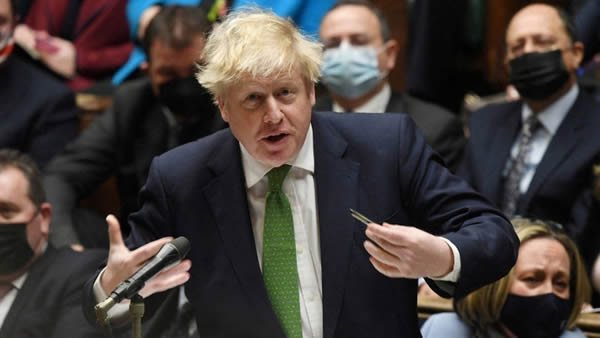
Prime Minister Boris Johnson says the UK will “continue to bring maximum pressure to bear” on Russia as he flies to Poland and Estonia.
He said Vladimir Putin would “feel the consequences” for invading Ukraine.
Foreign Secretary Liz Truss will also travel to Geneva on Tuesday to speak at the United Nations Human Rights Council.
The Russian army continues its advance on Kyiv, with satellite images spotting an armoured convoy about 40 miles long.
Air raid sirens were sounded again in the capital overnight, and there were also reports of fierce shelling in other cities including Chernihiv in the north.
It comes after fighting escalated on Monday, with missiles killing dozens of civilians in Kharkiv, Ukraine’s second city. President Volodymyr Zelensky described the bombardment as a war crime.
And International Criminal Court (ICC) prosecutor Karim Khan has said he plans to open an investigation into alleged war crimes in Ukraine as soon as possible.
Mr Johnson is due to meet the leaders of Estonia and Poland to discuss the response to the unfolding humanitarian crisis on Ukraine’s border, as well as European security.
He will also speak to Nato secretary-general Jens Stoltenberg and meet British troops serving in Estonia – which shares a border with Russia.
Ahead of the trip, Mr Johnson said: “Alongside all our international allies, the UK will continue to bring maximum pressure to bear on Putin’s regime to ensure he feels the consequences of his actions in Ukraine.
“We speak with one voice when we say, Putin must fail.”
Shadow defence secretary John Healey said the Labour party would support the UK government in responding to the invasion, adding: “The most important thing is there is a united UK voice, standing with the Ukrainians.”
How best to help Ukrainian refugees may be one subject Mr Johnson will discuss with his Polish counterpart on Tuesday. Poland says it has been trying to process more than 300,000 people who have fled from Ukraine.
The UK government is facing calls to make its visa rules clearer and to match the European Union’s offer to accept Ukrainian refugees for up to three years, without asking them to apply for asylum.
On Monday evening, Home Secretary Priti Patel said the government was working on the possibility of helping Ukrainian refugees come to the UK.
She told ITV’s Peston programme further changes to the UK’s policy would be announced in the next few days.
Hours earlier Ms Patel had told MPs she would not waive the visa requirement for Ukrainians fleeing the conflict, saying security checks were a “fundamental” part of the approval process.
The government has already made changes to visa rules allowing anyone settled in the UK to bring their immediate Ukrainian family members to join them.
On Tuesday, the Archbishop of York said the government was “lagging behind” in providing safe and easy routes for refugees, as they must acquire a visa before being able to come to the UK.
Stephen Cottrell told BBC Radio 4’s Today programme there was an urgent need to help the thousands of people “in the most desperate situation” who have fled to neighbouring countries like Poland.
“There are many flights from Poland every day and people can’t get on them because they don’t have a visa. We need to change this urgently,” he added.
In further diplomatic efforts, the foreign secretary will travel to Geneva on Tuesday, where she will address a meeting of the United Nations Human Rights Council (UNHRC).
On Monday, Ms Truss set out further sanctions against Russia, including powers to prevent Russian banks from clearing payments in sterling, freezing the assets of three more Russian banks, and announcing an export ban on “high-end technological equipment”.
She said the government would target a “hit list” of Russian oligarchs “focusing on their houses, their yachts and every aspect of their lives”.
At the meeting, Ms Truss is expected to say Mr Putin is “violating human rights on an industrial scale” and has been “murdering Ukrainians indiscriminately”.
It comes after President Putin ordered Russia’s military to put Moscow’s nuclear forces on “special alert” because of what Russia called “aggressive statements” by the West.
Kremlin spokesman Dmitry Peskov blamed “unacceptable” remarks about possible “clashes” between Nato and Moscow, including by “the British foreign minister”.
Mr Putin’s announcement, which has been met with international condemnation, does not mean Russia intends to use its nuclear weapons.
UK Defence Secretary Ben Wallace said the heightened nuclear alert was an attempt by the Kremlin to “distract” from what was “going wrong” with its assault on Ukraine.
Source: BBC























